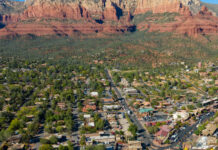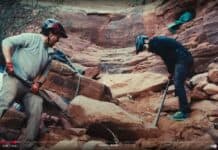Race organizer says event too costly to continue in future
Arizona’s weak economy has led to apparent death of one of Sedona’s newest signature events, the Sedona Marathon.
Director of the Sedona Marathon Karen Livesay made the announcement Wednesday, March 16, a little more than a month after the sixth annual race in West Sedona.
The costs of fees, permits, police overtime and insurance went into her decision to put the race on indefinite hiatus and completely cancel any 2012 race.
“Now we’ve got to evaluate if it’s the right time and the right place,” she said.
Livesay said the race typically loses money and this year cost between $80,000 and $100,000 but only brought in $60,000 to $80,000, leaving a loss of around $20,000.
“The race costs more than it brings in,” Livesay said. “I joke that it’s my personal philanthropy.”
Part of the increase to cost this year was the Arizona Department of Transportation raised required liability coverage 500 percent, Livesay said.
The ADOT portion covers 3,000 feet from Navoti Drive by the Sedona campus of Verde Valley Medical Center to Dry Creek Road. The race route then turns left onto city-owned Dry Creek, then onto Yavapai County-maintained highway north of city limits.
“The county actually takes care of us. They know we’re one of the best events we have,” Livesay said. “They just charge a nominal fees for processing.”
 The notice from ADOT came only a few weeks before the race began, requiring $5 million in insurance coverage, costing between $4,000 and $5,000, Livesay said.
The notice from ADOT came only a few weeks before the race began, requiring $5 million in insurance coverage, costing between $4,000 and $5,000, Livesay said.
“The city likes us because we do an excellent job bringing people to the area,” she said.
However, the city of Sedona also charged overtime for police traffic control. The city had waived marathon fees in past years, Livesay said.
She said she expected a similar decision from the city but was notified of the charge after the marathon by City Manager Tim Ernster.
The city supplied 43.5 overtime hours of support by off-duty police officers, charged at $44 per hour, for a total cost of $1,914. Police Explorers and volunteers also donated 90 free hours of support.
Ernster said the city had cut its overtime budget 25 percent this fiscal year and faced other cuts such as laying off two sergeants.
He added if the Sedona Marathon sent a letter requesting overtime support, he would include the request in his 2011-12 budget proposal to Sedona City Council.
The U.S. Forest Service also charges 5 percent of the marathon’s adjusted income for the privilege of running on a Yavapai County-maintained road through USFS land, Livesay said.
The response from racers and other attendees is the marathon is one of the best-run events in Arizona due to the organization, welcoming environment and small-town feel, according to Livesay.
Livesay said the marathon has to pay for traffic management and maintaining the facilities attendees use at the Sedona Cultural Park, where the race begins and ends.
The marathon charges runners between $25 and $100 to enter, depending on how early they register and the type of race they run — 5K, 10K, half marathon and full marathon, said Mindy Mendelsohn, the marathon’s public relations consultant. The event has only 200 marathon runners and early registrants pay less.
Typically, funding a big public event like a marathon doesn’t come from attendees but sponsors, Mendelsohn said. However, sponsorship has also diminished. Restaurants and businesses clearly benefit from the influx of visitors, but decline to support the race or have ceased funding despite full parking lots marathon weekend, Mendelsohn said.
The weak economy has reduced businesses’ willingness to donate, Livesay said. Many of the small costs add up, too, like post-race aluminum blankets, refreshments and plastic gift bags. The marathon also has 20 full-time and part-time employees. Livesay said she does not get paid.
The course is certified by the U.S. Association of Track and Field, allowing marathon runners to quote their times to races like the Boston Marathon. Only three marathons in Arizona are certified.
Every time the course changes, it must be remeasured and remapped. The rigorous certification process is costly, requiring specialized measuring equipment, so most cities and towns aren’t certified, Livesay said.
“Just imagine what the marathon could have been like if the economy was better,” she said.
“This is more than just about the marathon, it’s about the direction our town needs to take,” she said. “We are a tourist town, Arizona is a tourist state and Sedona is a part of that.”


















